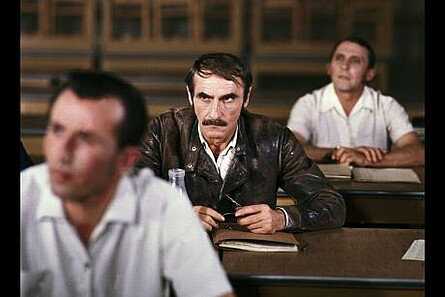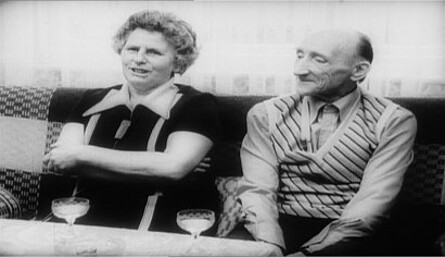
The Second Life Of Friedrich Wilhelm Georg Platow
GDR 1973 | 90 min
Directed by: Siegfried Kühn
Screenplay : Helmut Baierl, Siegfried Kühn
Camera: Roland Dressel
Music: Hans-Jürgen Wenzel
Actors: Fritz Marquardt, Anna-Katharina Frank , Hannelore Telloke , Fred Delmare , Gisela Hess, Jürgen Holtz , Gudrun Ritter,Jaecki Schwarz, Axel Triebel, die "Puhdys u.a.
"Progress" comes suddenly and unexpectedly upon railway lineman Platow. For years he has been carrying out his duties in Luege Station, and suddenly his lineman"™s cabinet is to be discontinued thanks to technical progress. Aged fifty-seven, Platow could take a comfortable job on a branch line and wait for retirement. When his son Georg rejects the offer of a supplementary training course, Platow makes an unusual decision. He pretends to be the man twenty years younger than he, and takes his place in the class. The physical transformation turns out to be the easiest; learning the unfamiliar material, however, demands all his resources and tricks. Platow"™s life is so topsy-turvy, that he even falls in love with young Malvine. Teacher Schildt seems to be a dangerous rival. In at least one area Platow shows the younger man what"™s what.
Director Sigfried Kühn is a keen observer of social interrelationsihps and gets his view of reality across with grotesque elements of repetition, a special colour-black-white artistic style and the wild "beat music" of the Puhdys. Platow"™s role is filled perfectly with Fritz Marquardt, who has made a name for himself as film director. This film got off to a quiet start with its poetic-subversive film realism (hardly three months after "The Legend of Paul and Paula"). This film about Platow is a subtle narration.
Ratings / Awards / Festivals
10th Festival of Central and East European Film "goEast", Wiesbaden

Don't Even Think I'll Cry
GDR 1965-1990 | 94 min
directed by: Frank Vogel
Screenplay: Manfred Freitag, Joachim Nestler
CAmera: Günter Ost Musc: Hans-Dieter Hosalla
Actors: Peter Reusse, Anne-Kathrein Kretzschmar, Hans Hardt-Hardtloff ,Harry Hindemith Helga Göring , Jutta Hoffmann, Herbert Köfer, Armin Mechsner , Horst Buder and others
Young Peter Naumann is disappointed, disappointed by all adults. Just before finishing secondary school he is banned from school for his essay on "The Republic needs you, you need the Republic," because his way of thinking does not agree with the desired norms and values. Peter is sometimes a defiant revolutionary, a free-thinker who rebels against the representatives of the State. When he meets and falls in love with Anne, he again runs into conflict with the system. Anne"™s father, socialist through and through, doesn"™t like his youthful, radical way of thinking and makes life difficult for him. Anne supports him, against her father, and fights for their love. At the end of his strength Peter still demonstrates his unshakeable will and with his words, "Don"™t even think, I"™ll cry," gives the film an obstinate, bitter taste.
Ratings / Awards / Festivals
Berlinale (Internationale Filmfestspiele Berlin) 1990 (Forum): "˜Werkschau der Regalfilme"˜; 23rd Film Festival of Amien 2003
Miss Butterfly
GDR 1965-66 | 118 min
Directed by: Kurt Barthel
Screenplay: Christa Wolf, Gerhard Wolf, Kurt Barthel
Camera: Hans-Jürgen Sasse, Claus Neumann Music: Peter Rabenalt
Actors: Melania Jakubisková, Christa Heiser, Carola Braunbock, Milan Sladek, Herwart Grosse, Rolf Hoppe and others
Christa and Gerhard Wolf, together with film director Kurt Barthel, wrote the story of "Miss Butterfly" ("Fräulein Schmetterling"). Their screenplay begins in a street of Old Berlin, between tenement houses of the 1870"™s; out front heaps of stuff lay around, stuff that collects in attics over the decades. Soon this part of town will disappear, the wrecking crews are nearing already. But a group of children is still playing with the leftovers of the past "“ an armchair without legs, a rocking chair, a golden picture frame, an old curtain, a top hat, a veil. Passersby stop and laugh. A young woman joins them. Ever so graciously she stands on her tiptoes, her feet lift from the earth, she rises into the air, floats through the maze of houses, high above the city "¦
A poetic modern fairy tale about young people"™s zest for life, a parable about breaking out of narrowness and normalcy, about the dream of happiness. The first showing of this still-existent, reconstructed film material was in June 2005.

Lot"™s Wife
GDR 1965 | 106 min
Directed by: Egon Günther
Screenplay: Egon Günther, Helga Schütz
Camera: Otto Merz Musik: Karl-Ernst Sasse, Gesang: Ruth Hohmann
Actors : Marita Böhme, Günther Simon,Klaus Piontek, Gerry Wolff , Rolf Römer , Elsa Grube-Deister , Wolfgang Greese
Sports Education teacher and trainer Karin Lot, mother of two children and married to an officer in the GDR People"™s Marines, suffers greatly when her husband doesn"™t come home on weekends. The couple has become indifferent to each other. Because pretending and lies, especially in front of the children "“ who are in seventh heaven at every visit of their father "“ have destroyed any real relationship to each other, Karin Lot is pushing for divorce. Her husband, however, refuses. Mainly out of fear of having to explain himself in his party faction but also out of love for the children and lastly out of a certain comfortableness "¦ After Karin has consulted with a lawyer she sees no other option for going through with the divorce than to do something criminal. She steals a piece of clothing in a department store, purposefully lets herself get caught and is sentenced to three months with suspended sentence. Richard Lot, now fearing for his position and reputation, files for divorce. He wants to keep the children. But in the divorce process their mother receives custody. Katrin is free "“ yet has paid a high price. She has lost her career. But from now on she can live without lies and hypocrisy.
Ratings / Awards / Festivals
Rating: worthwhile (Wertvoll), Berlinale (Internationale Filmfestspiele Berlin) 2002: retrospective

Working Familie in Ilmenau
GDR 1977 | 20 min
Directed by: Richard Cohn-Vossen
This film by Richard Cohn-Vossen was not released for showing in the GDR in 1977. The studio administration was willing to conduct further conversations with the director only if he withdrew his signature from the petition against the expatriation of Wolf Bierman. Instead, Richard Cohn-Vossen applied for an exit visa and left the GDR in 1979. Cohn-Vossen was able to smuggle the raw cut version of the film into West Germany and thus prevent its destruction. In 2011 the copy of the film was restored by the DEFA Foundation. In 1977 an altered version, approved by the State, came to the cinemas in the GDR "“ PORZELLINER by Heinz Müller.
Against the background of the changes from private cottage industrial production of household porcelain products to industrial production, the life situation and prospects of a worker and his wife come to the fore. Among other things, this film addresses the question of alienation from work as brought about by modern technology.

